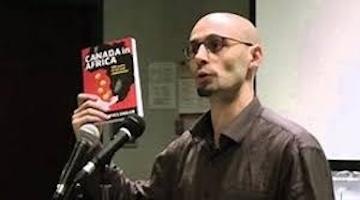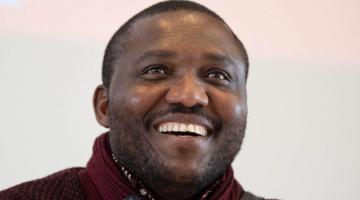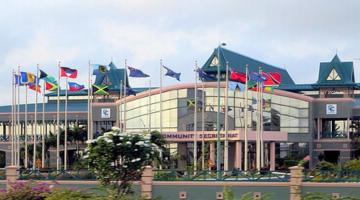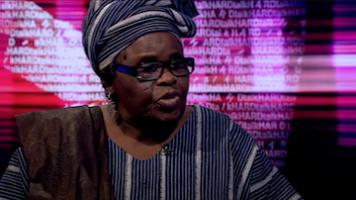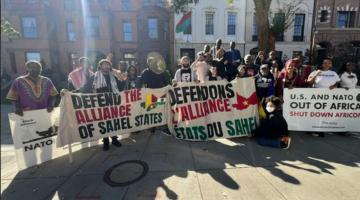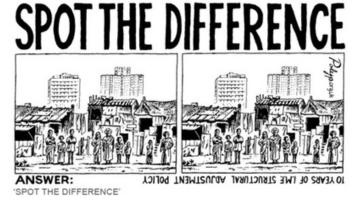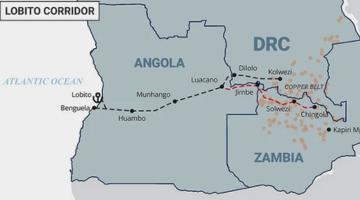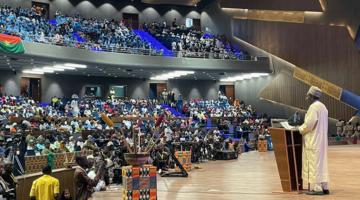Credit: Kolawole Oreoluwa.
Nigeria’s inability to refine its own oil is a legacy of British and US imperialism designed to maintain dependence. President Tinubu’s removal of the fuel subsidy was not an economic reform but an act of obedience.
On May 29th, 2023, the most unpopular, “democratically elected” Nigerian President obeyed the bidding of the US-based International Monetary Fund (IMF) and World Bank Group (WBG). After winning less than 40% of the popular vote, President Bola Tinubu announced the removal of fuel subsidies at his inauguration speech. This was intended to reduce the fiscal deficit, effectively redirect government spending, and stimulate economic growth. As the Nigerian bourgeois economists at KPMG (a US-based professional services firm) said, “Nigerians simply cannot have our cake and eat it!” Like the “international development” community, they argue that the fuel subsidy was wasteful and blocked economic development. What they do not emphasize is that Nigeria exports its crude oil to Europe, where it is refined and sold back into the country at a price unaffordable to Nigerians. This is because they would have to address the underlying problem, which is that centuries of British and U.S.-led imperialism underdeveloped Nigeria
Welfare Impacts of Fuel Subsidy Removal
The fuel subsidy removal went into effect on May 31, 2023, as the Nigerian National Petrol Company increased fuel prices nationwide from 165-181% (KPMG). Predictably, this only intensified the existing poverty, unemployment, insecurity, and overall underdevelopment across Nigeria. In 2019, Nigeria’s National Bureau of Statistics reported that roughly 40% of the population (almost 83 million people) lived below the national poverty line of 137,430 naira ($381.75) per year, or 376.52 naira ($1.05) per day. In the 5 years since then, almost 45 million more people have been estimated to enter poverty. According to WBG projections, almost half of all Nigerians (47%) in 2024 lived below the national monetary poverty line. The fuel subsidy removal most likely contributed to this. That same year, ODI-Global Nigerian researchers concluded that the fuel subsidy removal would disproportionately impact lower-income households. Rather than discourage fuel consumption, their econometric analysis showed that the increase in fuel prices would constrain household budgets, as most Nigerians are dependent on fuel as a source of energy. Moreover, Wave 5 (2023/24) of the Nigerian General Household Survey Panel (GHS-Panel) showed that ~75% of respondents replied “NO” when asked if the fuel subsidy removal was a good thing. When asked for a reason why, 69% replied “stopping the fuel subsidy has made the prices of goods go up”. The second most popular reply was “stopping the fuel subsidy has harmed the poor” (~26%). Additionally, the Bureau found that food insecurity increased in between Wave 4 (2018/19) and Wave 5 (2023/24) of the GHS-Panel, with at least 30% more households reporting that they had worries about “not having enough food to eat”, were “unable to eat healthy/nutritious preferred food”, and “ate only a few kinds of foods”.
These studies only confirm what journalists, activists, and everyday Nigerians have experienced since Tinubu took office–the 2023 fuel subsidy removal increased inflation, poverty, and hunger in Nigeria. This built up the mass social unrest behind the 2024 #EndBadGovernanceinNigeria movement and the TikTok #30daysrantchallenge in April of this year. The Lagos Branch of the #EndBadGovernance Movement summed up Tinubu’s presidency succinctly: two years of “hunger, hardship and pain”.
The Imperialist Dialectic of European Development from African Underdevelopment: Nigeria’s Declining Oil Sector and the Retrenchment of Fuel Subsidies
The “international development” community applies selective amnesia to provide ideological cover for imperialism. Calling attention to Nigeria’s fuel subsidy policy to combat climate change is disingenuous since Western countries contribute the most to it, they've have done very little to stop it, and African and Latin American countries are most adversely impacted by it. Framing Nigeria’s underdevelopment as an internal problem ignores the fact that fuel subsidy policy is connected to the violent creation and maintenance of the Nigerian colonial economy. The British imperialist-bourgeoisie blocked industrialization in Nigeria as their development was based on exploiting the country’s raw materials and labour. And through these exploiters collaborations with the Western-groomed, small Nigerian capitalist class, Nigeria’s economic dependence persisted after the country gained formal independence. This partnership advanced the capitalist development of the Nigerian ruling class and Western multinational corporations while deepening the underdevelopment of the Nigerian masses.
Looking at just the petroleum industry, we can see these relationships at play:
Petroleum exploration started in 1921 with the issue of two exploration licences to D’Arcy Exploration Co. and Whitehall Petroleum Company Ltd., with the former licence lapsing in 1923. Shell and British Petroleum, with their concession granted in 1937, set up an exploration camp at Owerri in eastern Nigeria. The first recorded export of petroleum from Nigeria was in 1958 with 245,000 barrels valued at £978,000…
Since most of the producers of these minerals were private foreign capitalists, it was they who appropriated the economic surplus generated in the sector. This imperialist expropriation was facilitated by the availability of cheap Nigerian labour and an abetting colonial administration. - Onimode (1982), “Imperialism and Underdevelopment in Nigeria: The Dialectics of Mass Poverty”
The petroleum industry, as of 1920 onwards, has been dominated by Western multinational corporations (MNCs) like Shell and BP. These MNCs not only specialize in extraction, but also in the refinement and distribution of oil. Despite this contradiction, the military dictatorships in the 1970s (when the fuel subsidy was introduced) supported the ambitions of their former colonial masters. Contrary to popular opinion, the military regimes were not politically neutral. Much like the petty-bourgeois nationalist parties (NCNC, AG, and NPC), the military regimes of Aguiyi-Ironsi (Jan 1966), Gowon (1966-1975), Mohammed (1975-1976), and Olusegun Obasanjo (1976-1979) had no alternative economic ideology of their own, and instead promoted (neo)colonial capitalist development.
This is likely why Nigeria’s four public refineries have operated at less than 25% capacity in the last 25 years. Moreover, the Nigerian National Refineries Special Task Force (NRSTF) described them as the worst among the 42 refineries in Africa between 2006 and 2009. And so, Nigeria imports over 80% of petroleum products consumed within the country, primarily from Belgium and the Netherlands.
On August 9th, 2025, the #Endbadgovernancemovement chapter in Lagos State, along with the Youth Rights Campaign of the Democratic Socialist Movement (a.k.a the Socialist Party of Nigeria), organized a public symposium to commemorate the summer 2024 protests and strategize a way forward. The wide range of activists and organizers that were in attendance represents a genuine effort to unite progressive forces in Nigeria against the anti-poor, pro-capitalist, neocolonial Nigerian state. And the timing of this symposium reflects their dedication to understanding and resolving the root causes of Nigeria’s poverty, misery, and underdevelopment. As some attendees articulated, this can only be possible by breaking away from the current economic system. Likewise, energy independence can only be possible through a popular, mass campaign waged by peasants, women, students, workers, and pastoralists to destroy imperialism in Nigeria. Only then can masses of Nigerians exercise democratic control over the petroleum industry and develop the capacity to refine its crude oil to meet the energy demands of 300 million people. Only then can Nigeria chart a path of development that benefits all Nigerians.
Article updated on September 17, 2025
Francis Phillip is a Nigerian student and organizer in the U.S. He attends Johns Hopkins University and is a member of the Union of Radical Political Economists (URPE), Nigeria Solidarity UK, and the Black Alliance of Peace. He is also the founder of New Zimo, an online anti-imperialist media platform focusing on Nigerian history and current events. Francis is also a co-founder of Nigerians United Against Imperialism, an organization of Nigerian activists and organizers in the U.S. committed to ending neocolonialism and imperialism in Nigeria and Africa.


